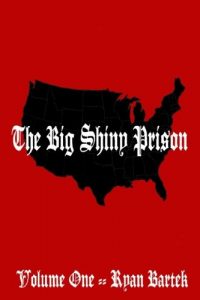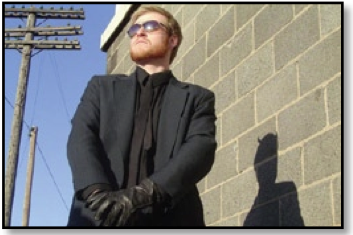After a year of riding Greyhounds, fine dining from garbage cans and sugar-stepping the advances of desperate meth addicts, Detroit expat Ryan Bartek releases his great American road journal, sans publisher, via the web. Why feature a writer unable to get a book deal? Because, Bartek has authored an entertaining and informative piece of underground Americana – and, the kid can write . . .
Interview:
Anthony Brancaleone: Congratulations on the completion of a fine endeavor. What can you tell me about the book?
Ryan Bartek: The Big Shiny Prison is a panoramic study of American Counterculture that combines underground music journalism with the classic autobiographical road novel. In short, years of experience & influence exploded like a volcano, sending me flying off like a cannonball. I’d reached age 25 and realized that it was “now or never,” since my situation was so hopeless in Detroit. Since I’d secured the gig writing for Metal Maniacs (as well as AMP, Hails & Horns, PIT Magazine), such exposure had upped my credibility to a sizable degree. So in December ‘06 I quit my band A.K.A. MABUS and hopped a Greyhound for San Diego, using that “commune” as a base of operations over the next year. I’d work a kitchen job two months, horde every penny, then hit the road for months until broke. The campaign lasted from December 21st 2006-October 13th 2007, having traversed 32 states and spending 606 hours on Greyhounds, all while interviewing hundreds of musicians/artists.
Brancaleone: Why is this book important? Who needs to read ‘The Big Shiny Prison’?
Bartek: The Big Shiny Prison is not a “music book” – it is a “Trojan Horse” intended for an audience that generally doesn’t read, and a literary academia that would otherwise be disinclined. While at first glance it may appear some metal/punk niche thing, it is rather an epic commentary on the absurdity and irrationalism of our times. Every fringe in America is touched upon, and every “interview” is meant to be read as the dialogue of a linear narrative. Each chapter is like an individual tarot card painted in heavy symbolism, contours framed by organic, pulsating environment… My art communicates not a specific agenda, but rather something primordial – I am seeking to incite change by example of direct action. I’m reaching out to a certain mindset, a specific vibe — people that feel more like “elementals” then they do humans, if you will.
Brancaleone: The idea of packing a bag and booking it cross-country seems very old school. I also like the added touch of recording interviews using a cassette recorder. Where do you belong in the current landscape of writing?
Bartek: I’m old school, absolutely. A) It’s what I’m used to, and B) I like wrapping a tape recorder on my chest with electrical tape. Adds a great effect… I don’t trust digital recorders because SKYNET hates me and will erase my interviews somehow… To the larger question you ask – years ago I willingly aced myself from the life which I was bound and simply wandered off a living host, viewing everything from the distant Zen-like standpoint of a man who’d already died. I work essentially as a loner in solitude – I never attended college or any sort of writer’s workshop. Since I escaped High School, my art has superseded anything in the social or material world… Regardless, know that I am merely a humble clown belonging only to my own mythological hemisphere…

Brancaleone: You have compared yourself to Kerouac, Hunter Thompson and Henry Miller. I recognize Kerouac and Thompson but Miller? If I had to choose a third, I would select Chuck Klosterman.
Bartek: I’ve never read Klosterman and the pompous bombast of Thompson is brilliant — but Henry Miller is the king. There is nothing I can say about the human experience that isn’t already summarized better in Tropic of Capricorn and Tropic of Cancer. Most have never heard of Miller, or have some vague notion about the aspects of sexuality in his writing. The sex stuff bores me – the Miller I consume is the Emerson-crazed, word drunk Miller; the anarho- theorist street hustler. At age 20 Capricorn was like a sledgehammer. All of Detroit was reduced to rubble and reformed in an organic, surreal way. Mid-way through reading that book 9/11 happened, and I just set it down and walked off into my own living novel (To Live and Die on Zug Island). From thereon I lived totally in this dimension of ebb & flow, falling into my own art. One thing leads to another… In Kerouac I embraced the quintessential Beat notion, as it was screamingly relevant to my Detroit upbringing. I’m a great believer in the Kerouac school of trance writing, yet also a fanatical editor opposed to slop-jobs. Kerouac is grand slam or strike out, yet perpetually worthwhile…
Branaleone: You also designate yourself a “Pan-Tribal Internationalist”, rather than a “scenester”, yet your book takes place entirely in America and it seems to cover a particular music ‘scene’.
Bartek: “Counterculture Internationalist” is more appropriate, but not in some angry 19 year old punk rock way. I throw my lot in with the freaks, per se, but in a broad historical context. I simply believe that there is a larger framework, a consistent movement of awareness that transcends divisions. Music and art scenes are simply incarnations of a continual awakening. At bottom I recognize the Counterculture as resistance culture – but an apolitical resistance. It is manifested in endless forms, evident in all cultures, yet it takes root in one basic notion — the emancipation of the spirit. Mankind by nature is a foraging, tribal species – yet we’ve reached a static future of mass populism encased in a nightmare of concrete. That, I feel, is the underlying premise of all of this – man expressing this divorce… In terms of “music scenes,” certainly when younger I gravitated to the heavy stuff, but I worship Morbid Angel as much as I do Frank Zappa or Danny Elfman. I’m into everything that is genuine and innovative. The Big Shiny Prison is an American road book, so naturally that’s the focus. The European book is scheduled for Summer 2011, and I’ve already been offered shelter/mobility in Dublin, Croatia, Hungary, Moscow, Belgrade, Paris, London, Berlin, Austria, Amsterdam, Oslo, Gothenburg & others.
Brancaleone: Describe your lowest point on the road and how you made it through.
Bartek: What most would describe bottom barrel terror I’d describe as fleeting inconvenience. During this book campaign I lived on the streets, sometimes for weeks – just showing up to some random city alone, sleeping in parks, alleys, whatever. I had little cash and often had to eat out of garbage cans. There were dozens of times where I should have died or was nearly attacked by meth-enraged street crazies or desperate junkies… For the most part the homeless cling to me like a magnet, because they instinctively know that I am not one of “the other people”… The street is the only world I feel real in. All else is an abstraction.
Brancaleone: Has your life as a Detroiter influenced you as a writer? How does the current Detroit music scene rate against the rest of the country?
Bartek: The most important lessons I ever learned from Detroit were that A) Environment dictates everything and B) Never underestimate the power of ignorance… I think I speak for a sizable chunk of the music/art community when I remark that the essential difference between my work and, say, a Kid Rock or an EMINEM, is that where they glorify everything comprising Metro, the entire basis of my spiritual & artistic quest is to escape everything that nightmare of concrete was. That much said, I also supremely admire its vileness and am proud to have endured it. In fact the greatest people I’ve ever known have all sprung from the territory – but also the biggest tools… You know, after all I endured there – once I finally got to Seattle and realized what could have been – I wept in the streets, especially having known so many that committed suicide because grim Detroit reality (not REAL reality) did them in. Make no mistake — I am of the Enemy Camp… My message to any Detroiter reading this is to abandon ship or simply cause supreme mischief. If you really want to wait around another 50 years for a sustainable existence, be my guest. You know, the fun thing about my work is that it’s all inclusive – which means anyone enamored by the world in which I operate is free to join, starting with the European Sequel of “The Big Shiny Prison.” Literally, whoever wants to come – all you need is a passport and a one way plane ticket. Just meet up with us in April 2011 and the rest is all on you…
The Big Shiny Prison Vol 1. available in paperback on Amazon

